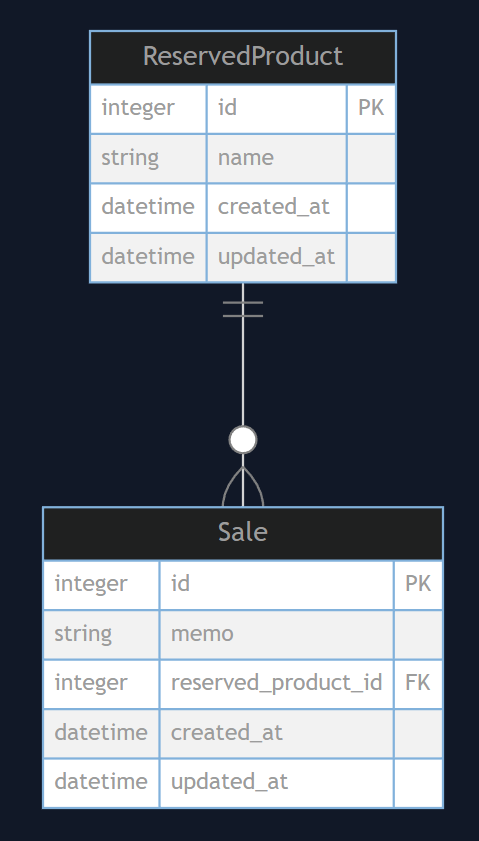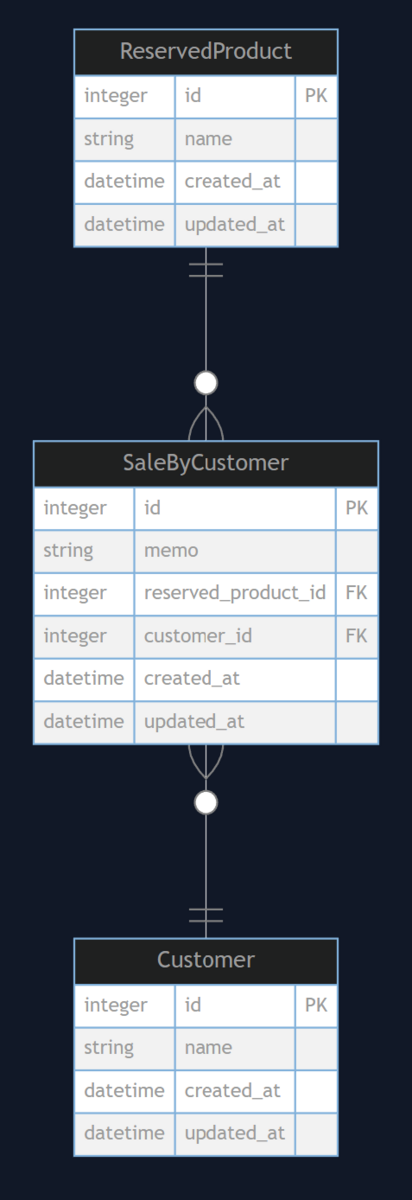以前、RailsのActiveRecordにて、 eager_load を使って
- 子側が存在しない場合は結果に含めずに抽出する
- 子側が存在しなくても、結果に含めて抽出する
をしました。
Railsで、eager_loadのLEFT OUTER JOINにて、WHERE句とON句のそれぞれで絞り込みしてみた - メモ的な思考的な
そんな中、「ある条件の関連先レコードがない関連元データだけを取得する」方法が気になったため、Railsガイドを見ながら試したことをメモとして残します。
Active Record クエリインターフェイス - Railsガイド
なお、今回は「適切にデータが取得できること」を目的とします。そのため、システムの仕様やRDBMSに関係する部分(用途やパフォーマンス)での良し悪しは考慮しません。
目次
環境
- Rails 7.0.4.2
関連先を絞らずに、関連先レコードが存在しない関連元データを取得する
本題に入る前段として、まずは「関連先を絞らずに、関連先レコードが存在しない関連元データを取得する」を試してみます。
データについて
テーブル構造
今回は、限定商品を管理するということで、限定商品(reserved_products) : 販売先(sales) = 1 : n となるようなテーブルを用意します。
models/reserved_product.rb
# == Schema Information # # Table name: reserved_products # # id :integer not null, primary key # name :string # created_at :datetime not null # updated_at :datetime not null # class ReservedProduct < ApplicationRecord has_many :sales end
models/sales.rb
# == Schema Information # # Table name: sales # # id :integer not null, primary key # memo :string # created_at :datetime not null # updated_at :datetime not null # reserved_product_id :integer not null # # Indexes # # index_sales_on_reserved_product_id (reserved_product_id) # # Foreign Keys # # reserved_product_id (reserved_product_id => reserved_products.id) # class Sale < ApplicationRecord belongs_to :reserved_product end
Rails mermaid ERDによるER図はこちら。
https://github.com/koedame/rails-mermaid_erd
各テーブルデータ
各テーブルには以下のようなデータが含まれています。
reserved_products
| id | name |
|---|---|
| 1 | りんご |
| 2 | バナナ |
| 3 | ぶどう |
sales
| id | memo | reserved_product_id |
|---|---|---|
| 1 | fooさん - りんご - 1つめ | 1 |
| 2 | fooさん - りんご - 2つめ | 1 |
| 3 | barさん - りんご | 1 |
| 4 | bazさん - ぶどう | 3 |
取得結果の期待値
今回は、関連先データとして sales がない reserved_products のレコード (ここではバナナ) を取得したいとします。
[#<ReservedProduct:0x00007f0f59c91d68 id: 59467727, name: "バナナ", ...]
実装パターン
LEFT OUTER JOIN + IS NULLで取得する
想定しているSQLはこちらです。
SELECT "reserved_products".* FROM "reserved_products" LEFT OUTER JOIN "sales" ON "sales"."reserved_product_id" = "reserved_products"."id" WHERE "sales"."id" IS NULL
これをActiveRecordで発行する場合の実装パターンはいくつかあるため、それぞれ見ていきます。
left_outer_joins + where を使う
このパターンで使う各メソッドは以下の通りです。
left_outer_joinsメソッドについてwhereメソッドについて
実装です。
ReservedProduct.left_outer_joins(:sales).where(sales: { id: nil })
発行されるSQLはこちら。
SELECT "reserved_products".* FROM "reserved_products" LEFT OUTER JOIN "sales" ON "sales"."reserved_product_id" = "reserved_products"."id" WHERE "sales"."id" IS NULL
Rails6.1から追加された missing を使う
Rails6.1にて WhereChainの missing が追加されましたので、こちらも試してみます。
- Rails 6.1: 孤立化したレコードのリストを取れる’missing’クエリメソッドが追加(翻訳)|TechRacho by BPS株式会社
- https://api.rubyonrails.org/classes/ActiveRecord/QueryMethods/WhereChain.html#method-i-missing
実装はこんな感じで、 left_outer_joins に比べるとシンプルです。
ReservedProduct.where.missing(:sales)
発行されるSQLも left_outer_joins と同じです。
SELECT "reserved_products".* FROM "reserved_products" LEFT OUTER JOIN "sales" ON "sales"."reserved_product_id" = "reserved_products"."id" WHERE "sales"."id" IS NULL
eager_load を使う
今回は関連先のデータは使用しないのですが、 eager_load も使えます。
eager_loadについて
実装は left_outer_joins と似たような感じです。
ReservedProduct.eager_load(:sales).where(sales: { id: nil })
発行されるSQLです。SELECT句が増えていますが、今回欲しいデータは取得できています。
SELECT "reserved_products"."id" AS t0_r0, "reserved_products"."name" AS t0_r1, "reserved_products"."created_at" AS t0_r2, "reserved_products"."updated_at" AS t0_r3, "sales"."id" AS t1_r0, "sales"."memo" AS t1_r1, "sales"."reserved_product_id" AS t1_r2, "sales"."created_at" AS t1_r3, "sales"."updated_at" AS t1_r4 FROM "reserved_products" LEFT OUTER JOIN "sales" ON "sales"."reserved_product_id" = "reserved_products"."id" WHERE "sales"."id" IS NULL
NOT IN で取得する
想定しているSQLはこちらです。
SELECT "reserved_products".* FROM "reserved_products" WHERE "reserved_products"."id" NOT IN ( SELECT "reserved_products"."id" FROM "reserved_products" INNER JOIN "sales" ON "sales"."reserved_product_id" = "reserved_products"."id" )
ActiveRecordではこうなります。
ReservedProduct.where.not(id: ReservedProduct.joins(:sales).select(:id))
NOT EXISTSで取得する
想定しているSQLはこちらです。
SELECT "reserved_products".* FROM "reserved_products" WHERE ( NOT EXISTS ( SELECT "sales".* FROM "sales" WHERE (reserved_products.id = sales.reserved_product_id) ) )
ただ、ActiveRecordでは EXISTS述語を発行できるメソッドはなさそうです(もしあったら教えていただけるとありがたいです)。
- https://api.rubyonrails.org/classes/ActiveRecord/QueryMethods.html
- mysql - Rails ActiveRecord WHERE EXISTS query - Stack Overflow
そのため、一部で生SQLを書く感じになります。
サブクエリをto_sqlし、whereに生SQLを渡す
EXISTS述語を含む部分をすべて生SQLで書くこともできます。
ただ、今回は to_sql を使ってEXISTS述語のサブクエリ部分のSQLをActiveRecordに任せることとします。
- Rails tips:
to_sqlでクエリをSQLに変換する(翻訳)|TechRacho by BPS株式会社 - https://api.rubyonrails.org/classes/ActiveRecord/Relation.html#method-i-to_sql
ActiveRecordではこうなります。
sql = Sale.where('reserved_products.id = sales.reserved_product_id').to_sql ReservedProduct.where("NOT EXISTS (#{sql})")
発行されるSQLはこちら。
SELECT "reserved_products".* FROM "reserved_products" WHERE ( NOT EXISTS ( SELECT "sales".* FROM "sales" WHERE (reserved_products.id = sales.reserved_product_id) ) )
whereにarrayを渡す
先ほどは to_sql を使いました。
ただ、以下の記事よると to_sql しなくても where だけで実現できそうです。
Because Rails follows standard naming conventions when querying (the downcased plural form of our model), we can add the above condition into our subquery without too much difficulty.
また、ActiveRecordの where の array の説明にも渡せそうな記述があります。
https://api.rubyonrails.org/classes/ActiveRecord/QueryMethods.html#method-i-where
試してみると、たしかに問題なく動作しました。
ReservedProduct.where('NOT EXISTS (:sales)', sales: Sale.where('reserved_products.id = sales.reserved_product_id'))
発行されるSQLも同じです。
SELECT "reserved_products".* FROM "reserved_products" WHERE ( NOT EXISTS ( SELECT "sales".* FROM "sales" WHERE (reserved_products.id = sales.reserved_product_id) ) )
ちなみに、 Advanced Active Record: Using Subqueries in Rails ではサブクエリで select('1') しています。
ただ、書籍「達人に学ぶSQL徹底指南書 第2版」(ミック著、翔泳社) によると、
EXISTS内のサブクエリのSELECT句のリストには、次の3通りの書き方があります。
- ワイルドカード: SELECT *
- 定数: SELECT 'ここは何でもいいんだよ'
- 列名: SELECT col
しかし、この3つの書式は、いずれも結果に違いがないのです。
達人に学ぶSQL徹底指南書 第2版 第1部 1-5 EXISTS述語の使い方
とのことなので、今回はサブクエリでは select('1') を書きませんでした。
Arelのexistsを使う
EXISTS述語を生SQLで書きたくない場合は Arel の exists も使えそうです。
- mysql - Rails ActiveRecord WHERE EXISTS query - Stack Overflow
- Deprecate delegating to
arelinRelationby kamipo · Pull Request #29619 · rails/rails
Arelを使って書くとこんな感じになります。
ReservedProduct.where(Sale.where('reserved_products.id = sales.reserved_product_id').arel.exists.not)
発行されるSQLはこちら。カッコが増えているくらいのようです。
SELECT "reserved_products".* FROM "reserved_products" WHERE NOT ( EXISTS ( SELECT "sales".* FROM "sales" WHERE (reserved_products.id = sales.reserved_product_id) ) )
なお、Arelで書くのは避けたほうが良さそうです。ただ、今回の実装であればそこまで複雑なものにはならなそうです。
Arelでクエリを書くのはやめた方が良い5つの理由 - Qiita
RSpecで動作確認
念のため、上記の各実装の結果が同じになることをRSpecで確認してみると、問題なくパスしました。
require 'rails_helper' RSpec.describe ReservedProduct, type: :model do let!(:apple) { create(:reserved_product, name: 'りんご') } let!(:banana) { create(:reserved_product, name: 'ばなな') } let!(:grape) { create(:reserved_product, name: 'ぶどう') } describe '関連先がない' do before do create(:sale, reserved_product: apple, memo: 'fooさん - りんご - 1つめ') create(:sale, reserved_product: apple, memo: 'fooさん - りんご - 2つめ') create(:sale, reserved_product: apple, memo: 'barさん - りんご') create(:sale, reserved_product: grape, memo: 'bazさん - ぶどう') end it 'いずれの結果も同じになること' do actual_by_left_join = ReservedProduct.left_outer_joins(:sales).where(sales: { id: nil }).to_a actual_by_missing = ReservedProduct.where.missing(:sales).to_a actual_eager_load = ReservedProduct.eager_load(:sales).where(sales: { id: nil }).to_a actual_not_in = ReservedProduct.where.not(id: ReservedProduct.joins(:sales).select(:id)).to_a actual_not_exists = ReservedProduct.where('NOT EXISTS (:sales)', sales: Sale.where('reserved_products.id = sales.reserved_product_id')) .to_a actual_not_exists_with_arel = ReservedProduct.where(Sale.where('reserved_products.id = sales.reserved_product_id').arel.exists.not).to_a expect(actual_by_left_join).to eq(actual_by_missing) .and eq(actual_eager_load) .and eq(actual_not_in) .and eq(actual_not_exists) .and eq(actual_not_exists_with_arel) end end end
ある条件の関連先レコードがない場合にその関連元データを取得する
続いて本題です。
データについて
テーブル構造
題材は同じですが、得意先ごとに限定商品を1つだけ買えるような構造とします。
- 限定商品(reserved_products) : 限定商品の得意先(sale_by_customers) = 1 : n
- 限定商品の得意先(sale_by_customers): 得意先 (customers) = n : 1
モデル + annotateはこんな感じです。
reserved_products
# == Schema Information # # Table name: reserved_products # # id :integer not null, primary key # name :string # created_at :datetime not null # updated_at :datetime not null # class ReservedProduct < ApplicationRecord has_many :sale_by_customers end
sale_by_customers
# == Schema Information # # Table name: sale_by_customers # # id :integer not null, primary key # memo :string # created_at :datetime not null # updated_at :datetime not null # customer_id :integer not null # reserved_product_id :integer not null # # Indexes # # index_sale_by_customers_on_customer_id (customer_id) # index_sale_by_customers_on_reserved_product_id (reserved_product_id) # # Foreign Keys # # customer_id (customer_id => customers.id) # reserved_product_id (reserved_product_id => reserved_products.id) # class SaleByCustomer < ApplicationRecord belongs_to :reserved_product belongs_to :customer end
customers
# == Schema Information # # Table name: customers # # id :integer not null, primary key # name :string # created_at :datetime not null # updated_at :datetime not null # class Customer < ApplicationRecord end
Rails mermaid ERDによるER図はこちら。
各テーブルデータ
reserved_products
| id | name |
|---|---|
| 1 | りんご |
| 2 | バナナ |
| 3 | ぶどう |
sale_by_customers
| id | memo | reserved_product_id | customer_id |
|---|---|---|---|
| 1 | fooさんのりんご | 1 | 1 |
| 2 | fooさんのバナナ | 2 | 1 |
| 3 | fooさんのぶどう | 3 | 1 |
| 4 | barさんのりんご | 1 | 2 |
| 5 | bazさんのバナナ | 2 | 3 |
| 6 | bazさんのぶどう | 3 | 3 |
customers
| id | name |
|---|---|
| 1 | foo |
| 2 | bar |
| 3 | baz |
取得結果の期待値
指定した得意先 (customer) に対して、reserved_productsがsale_by_customersに存在しないレコードをreserved_productsから取得したいとします。
# fooさん
=> []
# barさん
=> [#<ReservedProduct:0x00007f77b1348e58 id: 59467727, name: "バナナ", ...>,
#<ReservedProduct:0x00007f77b1330718 id: 938768738, name: "ぶどう", ...>]
# bazさん
=> [#<ReservedProduct:0x00007f77b1322dc0 id: 690933842, name: "りんご", ...>]
実装
今回は「指定した得意先」という動的な絞り込み条件が必要です。
そのため、関連先を絞らない場合で使っていたメソッドが使えないケースも出てきます。
LEFT OUTER JOIN + ON句での絞り込み + IS NULL で取得する
想定しているSQLはこちらです。
JOINする前に customer の絞り込みが必要になることから、ON句にて絞り込みを行っています。
仮にWHERE句で絞り込みを行おうとしても、 customers の各列がNULLになるため、customer.id での絞り込みはできません。
SELECT "reserved_products".* FROM "reserved_products" LEFT OUTER JOIN sale_by_customers ON ( reserved_products.id = sale_by_customers.reserved_product_id AND sale_by_customers.customer_id = 【指定した得意先】 ) WHERE "sale_by_customers"."id" IS NULL
このパターンについては実装が大きく変更となっています。
モデルのscope + joinsで生SQL + where
以前の記事でも調べましたが、ActiveRecordでON句を指定してJOINするようなメソッドはなさそうでした。
- https://api.rubyonrails.org/classes/ActiveRecord/QueryMethods.html
- Railsで、eager_loadのLEFT OUTER JOINにて、WHERE句とON句のそれぞれで絞り込みしてみた - メモ的な思考的な
そこで、 joins メソッドには結合条件の生SQLを渡すことができるのを利用します。
- ruby on rails - How to left outer joins with conditions - Stack Overflow
- https://api.rubyonrails.org/classes/ActiveRecord/QueryMethods.html#method-i-joins
また、長めの生SQLを何度も書くことになるため、scopeを定義し引数として customer.id を受け取れるようにします。
15.1 引数を渡す | Active Record クエリインターフェイス - Railsガイド
なお、引数をそのまま埋め込むのではなく、ActiveRecordのサニタイズ系メソッドを使うようにします。
https://api.rubyonrails.org/classes/ActiveRecord/Sanitization/ClassMethods.html
今回はON句でのサニタイズなので、 sanitize_sql_array を使います。
- 週刊Railsウォッチ(20180813)Rails 5.2.1リリース、sanitize_sql_arrayは5.2からpublicだった、Dev.toがRailsアプリのソースを公開ほか|TechRacho by BPS株式会社
- https://api.rubyonrails.org/classes/ActiveRecord/Sanitization/ClassMethods.html#method-i-sanitize_sql_array
まとめると、こんな感じのscopeを ReservedProduct モデルに作ります。
class ReservedProduct < ApplicationRecord has_many :sale_by_customers scope :no_reservations_by, ->(customer_id) { sql = ApplicationRecord.sanitize_sql_array( ['LEFT OUTER JOIN sale_by_customers ON (reserved_products.id = sale_by_customers.reserved_product_id AND sale_by_customers.customer_id = :customer_id)', { customer_id: customer_id }]) joins(sql).where(sale_by_customers: { id: nil }) } end
定義したscopeを使うことで、期待するSQLや結果が取得できました。
# 実行 ReservedProduct.no_reservations_by(1) # 結果 # ReservedProduct Load (0.2ms) SELECT "reserved_products".* FROM "reserved_products" # LEFT OUTER JOIN sale_by_customers # ON (reserved_products.id = sale_by_customers.reserved_product_id AND # sale_by_customers.customer_id = 1) WHERE "sale_by_customers"."id" IS NULL #=> []
NOT IN で取得する
想定しているSQLはこちらです。
SELECT "reserved_products".* FROM "reserved_products" WHERE "reserved_products"."id" NOT IN ( SELECT "reserved_products"."id" FROM "reserved_products" INNER JOIN "sale_by_customers" ON "sale_by_customers"."reserved_product_id" = "reserved_products"."id" INNER JOIN "customers" ON "customers"."id" = "sale_by_customers"."customer_id" WHERE "sale_by_customers"."customer_id" = 【指定した得意先】 )
ActiveRecordではこうなります。
ReservedProduct.where.not(id: ReservedProduct.joins(sale_by_customers: :customer).where(sale_by_customers: { customer_id: 1 }).select(:id))
NOT EXISTSで取得する
想定しているSQLはこちらです。
SELECT "reserved_products".* FROM "reserved_products" WHERE ( NOT EXISTS ( SELECT "sale_by_customers".* FROM "sale_by_customers" WHERE ( reserved_products.id = sale_by_customers.reserved_product_id ) AND "sale_by_customers"."customer_id" = 【指定した得意先】 ) )
Arelを使う/使わないで実装が若干異なるため、それぞれ見ていきます。
whereにarrayを渡す
ActiveRecordではこうなります。
ReservedProduct.where('NOT EXISTS (:sale_by_customers)', sale_by_customers: SaleByCustomer.where('reserved_products.id = sale_by_customers.reserved_product_id').where(customer_id: 2))
Arelのexistsを使う
Arelを使う場合はこうなります。
ReservedProduct.where(SaleByCustomer.where('reserved_products.id = sale_by_customers.reserved_product_id').where(customer_id: 2 ).arel.exists.not)
RSpecで動作確認
先程と同じくRSpecのテストコードがパスすることも確認します。
require 'rails_helper' RSpec.describe ReservedProduct, type: :model do let!(:apple) { create(:reserved_product, name: 'りんご') } let!(:banana) { create(:reserved_product, name: 'ばなな') } let!(:grape) { create(:reserved_product, name: 'ぶどう') } describe '条件付きの関連先がない' do let!(:foo) { create(:customer, name: 'foo') } let!(:bar) { create(:customer, name: 'bar') } let!(:baz) { create(:customer, name: 'baz') } before do create(:sale_by_customer, reserved_product: apple, customer: foo) create(:sale_by_customer, reserved_product: banana, customer: foo) create(:sale_by_customer, reserved_product: grape, customer: foo) create(:sale_by_customer, reserved_product: apple, customer: bar) create(:sale_by_customer, reserved_product: banana, customer: bar) create(:sale_by_customer, reserved_product: grape, customer: baz) end shared_examples 'いずれの結果も同じになること' do it do actual_by_scope = ReservedProduct.no_reservations_by(customer_id).to_a actual_not_in = ReservedProduct.where.not(id: ReservedProduct.joins(sale_by_customers: :customer) .where(sale_by_customers: { customer_id: customer_id }) .select(:id)) .to_a actual_not_exists = ReservedProduct .where('NOT EXISTS (:sale_by_customers)', sale_by_customers: SaleByCustomer .where('reserved_products.id = sale_by_customers.reserved_product_id') .where(customer_id: customer_id)) .to_a actual_not_exists_with_arel = ReservedProduct .where(SaleByCustomer.where('reserved_products.id = sale_by_customers.reserved_product_id') .where(customer_id: customer_id ).arel.exists.not) .to_a expect(actual_by_scope).to eq(actual_not_in).and eq(actual_not_exists).and eq(actual_not_exists_with_arel) end end context 'fooさんの予約がない' do let(:customer_id) { foo.id } it_behaves_like 'いずれの結果も同じになること' end context 'barさんの予約がない' do let(:customer_id) { bar.id } it_behaves_like 'いずれの結果も同じになること' end context 'bazさんの予約がない' do let(:customer_id) { baz.id } it_behaves_like 'いずれの結果も同じになること' end end end
ソースコード
Githubに上げました。
https://github.com/thinkAmi-sandbox/rails_association-sample
プルリクはこちら。
https://github.com/thinkAmi-sandbox/rails_association-sample/pull/4

